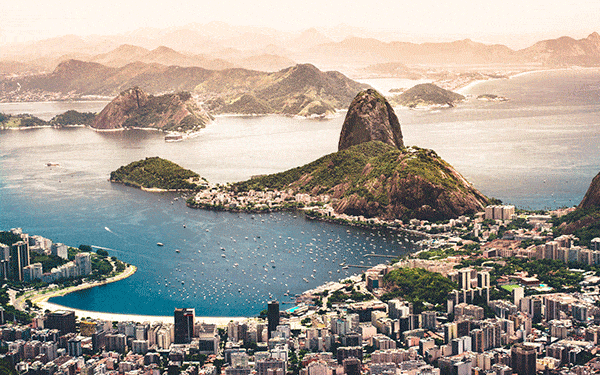Are you considering moving to Brazil from the UK? Make sure you read this guide first.
Beaches lined with perfectly bronzed bodies, lush tropical rainforests bursting with wildlife, and the most outrageously extravagant carnival in the world are just some of the things that lure people from all over the world to this heavenly hotspot.
Brazil is the largest country in South America and boasts incredible urban and natural landscapes infused with an unparalleled exotic atmosphere.
In the cities there are lively streets, world class restaurants, and a pumping, cocktail fuelled party scene. Venture outside the city and you open up a world of quaint colonial towns and incredible natural landscapes to explore.
Tempted to make the move to Brazil? Read on to discover al the important stuff you need to know about moving to Brazil from the UK in our comprehensive guide.
Contents
Brazil Visa Requirements for Brits
Visiting
For the moment as a Brit you are able to enter Brazil for a stay of up to 90 days without a visa — although this may be subject to change after Brexit.
Make sure that your passport is valid for at least 6 months after your chosen date of entry to Brazil.
Working
Working in Brazil is a little more tricky and the process may take a few months to complete.
In order to apply for a work permit, you will first need to have a residence visa and an offer of employment from a Brazilian business who will act as your sponsor.
Your future employer must apply to the Brazilian Ministry of Labour and Employment for a work visa on your behalf by submitting documents such as your passport, CV, and your work contract.
Once the application is approved in Brazil, it is then necessary to apply for a Brazilian work visa back in the UK at the Brazilian embassy or consulate.
There are various different work permits, and the type of work visa you require will depend on the type of activity you will be doing in Brazil.
The most common work visa for foreigners in the temporary work visa which is granted for a period of 2 years, after which time you must re-apply.
After 4 years of working with temporary visas, it is possible to apply for a permanent work visa. If at any time you change jobs to work for a different employer you’ll need to reapply for a new permit.

Permanent Residency
If you’re looking to retire to Brazil and you or your spouse are over the age of 60 with a guaranteed monthly income of 6000 BRL (around £1,200) or more, you are eligible for a retirement visa which allows you to live permanently in Brazil. I
f this doesn’t apply to you there are various other ways you can qualify for permanent residency.
If you marry a Brazilian citizen you are automatically entitled to a permanent residence visa, likewise if you have a child that was born on Brazilian soil.
Another alternative is to make an investment, either by becoming an administrator or manager of a corporation or start up enterprise, or by making a significant financial investment of 500,000 BRL in a Brazilian enterprise.
Any application for permanent residency involves a lot of bureaucratic red tape, and the application process is long and complicated, so be prepared to be patient and consider paying for the services of a Despachante who will do most of the hard work for you.
Way of Life in Brazil
Lifestyle

The Brazilians are a passionate bunch who love the outdoors, sport and the arts, take extraordinary pride in their personal appearance, and who are known to be generous and welcoming — it’s normal to greet people with kisses on both cheeks, and don’t be surprised by the frequent personal contact as they are very tactile and expressive when making conversation.
Family is central to the Brazilian culture, and many social activities revolve around family events.
The pace of daily life is unhurried and relaxed, so be prepared to go with the flow even if at times it may be frustrating.
This is a wonderfully ethnically diverse nation, but as English isn’t widely spoken — particularly outside of the major cities — the best way to integrate is to learn the language, Portuguese.
Celebration is a way of life here, and Brazilians fill every occasion with joy, community togetherness and artistic expression.
In recent years the cities have become overcrowded, and levels of poverty, unemployment and crime have risen steadily, with many people living in city slums. Whilst this may be off-putting for some expats, as long as you get to know your surroundings stick to safer areas you shouldn’t be at risk.
Getting Around
Exploring Brazil means travelling long distances, and the most obvious way to make the route is by plane.
The main drawback with domestic air travel is that flights can be pricey, however the air network is superb, with airports in every city and air strips in towns.
For multi-leg trips within the country, it can be worthwhile to invest in a TAM air pass which will save you money when travelling between your choice of 4 different destinations.
More recently, several budget airlines have started to emerge which offer better value for money, but understandably these carriers are popular, so it is necessary to book your flight well in advance.
Buses are a cheaper travel method for journeying around Brazil. The bus network is extensive, and the majority of buses are comfortable and efficient.
Certain companies offer luxury bus services — often sleeper coaches which drive throughout the night — called leitos, which are ideal for travelling long distance.
Surprisingly, train travel is not a good option when travelling from place to place as there are very few passenger trains.
That said, certain major cities including Rio and Sao Paolo have decent metro systems for getting around with rechargeable travel cards. .
In towns and cities taxis are plentiful, and won’t cost you an arm and a leg. City taxis are always metered, with a two tier system, with rate 1 being cheapest for off peak travel, and rate 2 being more expensive for out of hours and holidays.

Driving in Brazil
If travelling under your own steam is more your thing, there are certain factors to consider before you get behind the wheel in Brazil.
The standard of driving is generally poor with other drivers paying little heed to regulations or safety, the result of which is a high accident rate and a high death toll on the roads.
Depending on where you are in the country, the road quality will vary, but expect badly lit roads with plenty of potholes and bumps.
Most cities however are well signposted, but keep your wits about you and don’t expect other drivers to respect the rules of the road.
UK driving licenses are accepted in Brazil for up to 6 months, but an international driving license is essential if you’re thinking of driving around the country long term.
If you don’t have your own vehicle, renting a car is fairly simple as there are plenty of familiar international car rental companies.
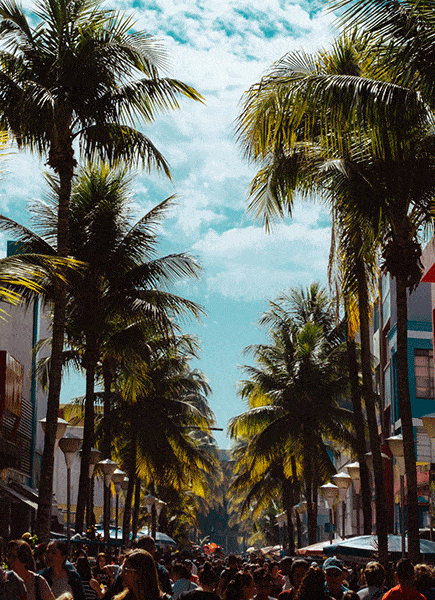
Weather in Brazil
With consistently high temperatures, Brazil generally has an agreeable climate all year round, but being such a huge and topographically diverse country, the weather can vary between locations.
Most of the country has a humid subtropical climate, although the north east of the country is much drier.
The centre of the country — also known as the Brazilian highlands — is prone to storms and torrential downpours between the months of November to April, but can also experience debilitating periods of drought. Winter in this area brings dry weather with regular frosts.
Coastal cities like Rio and Salvador are hot and sticky pretty much all year round with seasonal showers and storms, whilst inland cities such as Sao Paolo are significantly milder.
The north of the country — home to a large proportion of the Amazon rainforest — boasts average annual temperatures of between 24°C to 26°C, while the south features cooler winters and hotter summers, with average seasonal temperatures of between 10°C and 15°C in winter, and between 24°C and 32°C in summer.
Cost of Living in Brazil
Lifestyle
Despite problems with poverty, the cost of living in Brazil remains relatively high and on a par with many European countries, although it’s worth noting that city prices are always significantly higher than those in rural areas.
Expats with international employers generally receive significant salaries which put them at the comfortable to wealthy end of the spectrum.
The cost of groceries is moderate, with prices not dissimilar to those of the UK, with local produce being the most affordable, and imported products being the most expensive.
Eating out can be fairly expensive in the big cities (think London prices for a meal in a decent restaurant) so many expats choose to cook their own meals at home.
As the Brazilians are such big party goers, there are a wealth of entertainments on offer, with many being free, but expect to pay moderate entrance fees for nightclubs and drinks.
Take a look at this video for more info on the cost of living in different cities across Brazil:
Rent
Prices for rental accommodation in the cities are relatively high (£400 and upwards for a studio apartment) but expats working for international companies often receive an accommodation allowance as part of their work contract to offset the costs.
There are also significant price differences between the cities, with the price for a studio apartment being nearly twice as expansive in Rio as in Belem, for example. If you rent an apartment from a private owner, you should normally be able to negotiate a little on the price.
Healthcare
As in the case of the UK, Brazil benefits from it’s own public health service, Sistema Unico de Saude (SUS), which is free of charge to foreigners as well as Brazilian citizens.
However also just like the UK, this free healthcare service is not without its problems.
The quality of care is generally good, but due to a lack of financing and a lack of services in rural areas, city hospitals can be overcrowded, with overworked staff and long waiting lists.
Health insurance is compulsory for expats living in Brazil, and most expats rely on private health services. The cost of health insurance varies depending on your age and fitness.
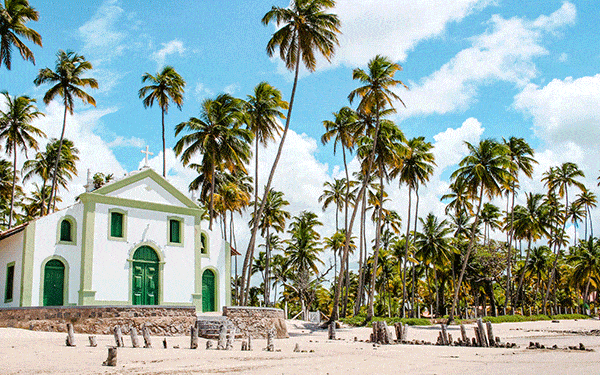
Schooling
Lessons in Brazilian public schools are taught in Portuguese with a high demand for places, and although improvements have been made in recent years, the quality of education in these schools remains relatively low.
Consequently the majority of expats with younger children prefer to send them to one of Brazil’s private international schools where the standard of education is much higher and lessons are predominantly taught in English with a UK or American curriculum.
Unfortunately, due to the popularity of these schools amongst expat families, competition for places can be tough with long waiting lists, and admission fees extremely expensive, costing the equivalent of thousands of pounds per month.
Popular Areas for Brits
Rio de Janeiro
Rio is also known as ‘The Marvellous City’, and with good reason.
Surrounded by an awe inspiring natural landscape of verdant rainforest blanketed mountains and crystal clear lakes, and with incredible beaches, this city sings to a sexy rhythm all of its own.
The party atmosphere seeps into every aspect of life, and the nightlife is second to none.
Add this to the stunning architecture, delicious cuisine, beautiful people, and serious shopping, and you’ve got a city destination that delights expats from all over the globe.
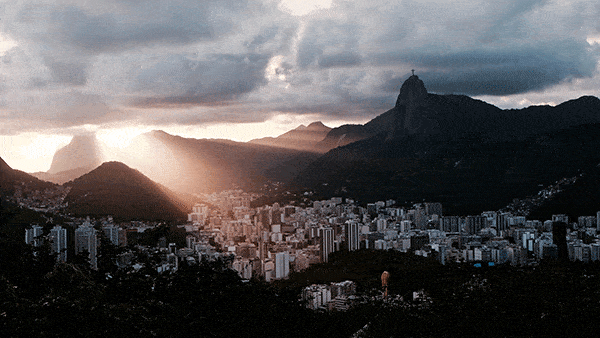
Sao Paulo
The largest city in Brazil, Sao Paolo is rich with culture and an extraordinary energy.
Arty types will adore the art house cinemas, museums, theatres, music venues and galleries, whilst party animals won’t be able to get enough of the hedonistic nightlife.
Amazing restaurants abound, and there are a surprising amount of green spaces for such a sprawling metropolis.
This may not be Brazil’s most beautiful city, but what it lacks in looks it makes up for in spades with a whole host of other cosmopolitan temptations.
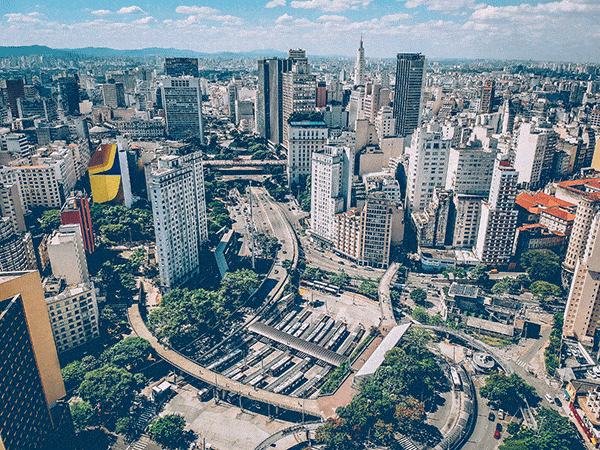
Salvador
Arguably Brazil’s most musical city, vibrant Salvador is alive with bars and festivals which beat to a distinctly African rhythm owing to its history as a centre for the slave trade.
Streets are lined with brightly painted colonial buildings, and just outside the city a glittering coastline littered with pristine beaches awaits sun seekers.
Curitiba
Laid back and sophisticated Curitiba is famous for it’s unique urban landscape — a feat of urban planning filled with oodles of picturesque green spaces and urban parks and a innovative infrastructure.
This city offers expats a temperate climate, a high quality of life, and a warm welcome.
Brasilia
Most people have Rio come to mind when they think of Brazilian cities, but Brasilia is Brazil’s ultra modern capital bursting with futuristic urban vistas, city parks, restaurants and tourist attractions.
Florianopolis
Encompassing the island of island of Santa Catarina in Southern Brazil, Florianopolis boasts some of Brazil’s best beaches.
If you love the outdoors you will love this city with its endless opportunities for swimming, watersports, trekking, and exploring the lush island rainforests.
Full of charm, Florianopolis has a pleasant bohemian vibe, with lovely restaurants and fun night spots to please locals and travellers alike.
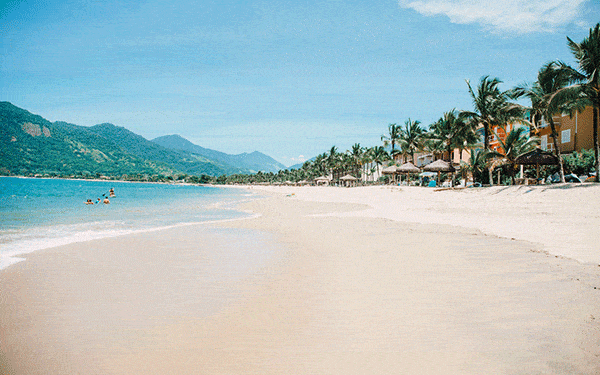
Jobs in Brazil for British Expats
Whilst opportunities exist, it can be tricky for British expats to find employment in Brazil.
Brazilian employers are required to respect the principle of proportionality, which obliges them to have a workforce made up of two thirds Brazilian citizens, which limits the potential number of jobs available for foreigners.
That said, there are many international companies based in the big cities with jobs available, and Brits can also consider teaching English or jobs in the tourism sector.
Speaking Portuguese and having a high in demand skill set will give you a serious advantage when seeking work.
Are you thinking of moving to Brazil from the UK?

